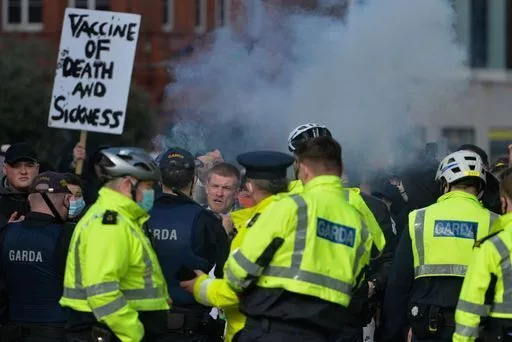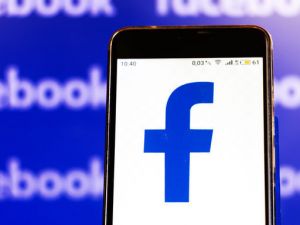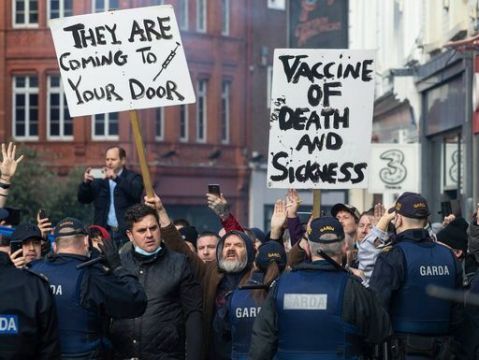Conspiracy theories are often only ever seen in the fringes of society, but the Covid-19 pandemic has led to a 'perfect storm' in the rise of this type of thinking.
Theories around lockdown, 5G, Covid-19 vaccines and the virus itself have been prevalent on social media and some of the more sinister aspects of Covid conspiracy theories were seen at the recent anti-lockdown protest in Dublin.

While there were many groups present, with many not intent on violence, and there is nothing linking conspiracy theories directly to the violence that occurred, signs with slogans like 'Covid is a lie' were widespread among the 2,000 protesters present.
Conspiracy theory groups on Facebook and Telegram continue to propagate falsehoods surrounding lockdown and the Covid vaccine being a government attempt to control the population, with many of these bearing strong similarities to QAnon conspiracies that are prevalent in the United States.
Dr Simon Dunne, assistant professor in psychology at Dublin City University, and Dr Stephen Murphy, assistant professor in marketing at Trinity College, spoke to BreakingNews.ie about the rise in conspiracy theories and how they are thriving in pandemic conditions.
Dr Dunne explained that “one of the most fundamental reasons people tend to believe in conspiracy theories is to deal with or manage uncertainty, or feel a sense of belonging”.
He also attributed feelings of a lack of control in life as a factor in people turning to conspiracy theories.
“A key area which research has found a link to the uptake of conspiracy belief is where events seem like they are random or uncertain, or where people feel like they have no control and are anxious about a threatening situation.
“The pandemic itself we know has led to a huge loss of control in everyday behaviour and a very real threat of mortality.
“That often results in an increased desire to explain the situation or do something to regain control. Increased feelings of vulnerability can increase a belief in conspiracy theories and a need to try to regain control.”
There is a growing sense of distrust in experts, elites, politicians and institutions
Dr Murphy, who has researched conspiracy theories in the UK, cited lockdown, the amount of time people are spending on social media, and a sense of distrust in public health experts and politicians as factors in people gravitating towards conspiracy theories.
“We’ve all lost the personal freedom to move around and to socialise with friends and family.
“As a consequence, people are feeling the financial pressure, but also feeling really isolated, and lockdown has obviously created a situation where people are spending more and more time on social media than ever before.
“There is also a growing sense of distrust in experts, elites, politicians and institutions.”
Perfect storm
“These kinds of conditions seem to have created the perfect storm when it comes to the spread of conspiracy theories. Conspiracy theories flourish in times of crisis because these kinds of moments give us pause for thought and force us to reflect on the world and our place in it.”
The nature of the pandemic makes some uncertainties inevitable and Dr Dunne said people who turn to conspiracy theories may look for 'alternative facts' due to distrust in experts and scientists.
“Since last March, there’s been a huge amount of changing evidence and changing recommendations, this is inevitable but to some people this will have done a lot of damage to their expert status in a way,” he explained.
“Predicting the potential course and development of Covid was so full of unknowns that it would have been impossible to predict absolutely everything. When those things don’t come to pass, it can be problematic for some people who are anxious about the virus and crave some kind of certainty or control.
“Key examples are the scientists who went on record saying things like ‘you don’t need to wear a mask’ early on, and then they reversed those recommendations later on.
“If you have a look at some of the messaging that comes up on news articles and forums online they often focus on these perceived inconsistencies.
“Then there’s that contradiction that happens, it’s been unfortunate at key stages with Government decisions and Nphet advice, that’s been very much scrutinised by the public.”
People who feel alienated or vulnerable can often find a sense of community in groups promoting conspiracy theories on social media, leading them down a rabbit hole of misinformation.

“A lot of online forums and conspiracy theory groups provide a community and a sense of belonging that might seem attractive to individuals that are vulnerable in those ways.
“These groups are often an echo chamber of support for each other where individuals support each other by trying to find clues that support some grand narrative.”
Dr Murphy pointed out that people who may go into these groups with a curiosity about conspiracy theories can soon become engrossed in them and drift further away from accepted truths and science.
“Social media provides extremely fertile ground for the proliferation of conspiracy theories.
“Where previously aspiring ‘truth seekers’ may have experienced push back from friends or family for sharing conspiracy theories, they can now join massive communities of like-minded people on social media. Within these online communities they can share alternative views without fear of ridicule or reprehension.
“There is also a kind of competitive dynamic to conspiracy theory communities on social media. Those that dare to go further down the rabbit hole are celebrated as ‘heroic truth seekers’ within the community. Status is gained through wholesale rejection of expert systems and deeper engagement with ‘stigmatised knowledge’ — particularly knowledge that is judged too hot for others to handle.”
Most people aren’t feeling safe or in control, but it’s compounded by individuals who really feel isolated and marginalised from others, that’s where those people would be particularly vulnerable
Dr Dunne said one of the biggest conspiracy theories in relation to Covid-19 centred on it being created as a means of population control, something which he feels appeals to a broad base of people feeling isolated or alienated from society.
"Some of the big conspiracy theories that are being talked about at the moment are the idea that the virus was created as a population control measure or a means of trying to impose an authoritarian regime on the public.
“Often when there are inconsistencies or changing messages, the scientists get lumped in as they claim they’re somehow supporting this agenda. It becomes very problematic in that regard as scientists become part of their narrative.
“Most people aren’t feeling safe or in control, but it’s compounded by individuals who really feel isolated and marginalised from others, that’s where those people would be particularly vulnerable.”
While the spread of conspiracy theories around Covid may seem to have occurred rapidly, Dr Dunne points out that people who are susceptible to one conspiracy theory will often fall into others.
Grand narratives
These people also look for signs to support what he calls their “grand narratives”.
“The chances that they believed in a prior one [conspiracy theory] relating to some grand narrative of a global conspiracy is very high.
“People who often believe in those grand narratives tend to look for them, or patterns of them in new contexts. There’s been a lot of social psychology research to support this.
“Individuals who feel isolated often latch on to various conspiracy theory beliefs and one can often fuel another or be linked to others and people who get into this way of thinking start to see these supposed patterns to support their narrative or agenda. These are things that are constantly being supported by members of online forums and chat groups who encourage or reward a certain amount of this way of thinking.”
Dr Dunne said many of the theories that have filtered into Ireland from groups in the United States, some who were linked to the pro-Donald Trump assault on the US Capitol on January 6th, pick and choose elements to support theories linked to Ireland and lockdown.
Disinformation
“There are various tactics that conspiracy theorist groups use to spread disinformation and get people to buy into a narrative.
“One of the most consistent ones, even before Covid-19, has been over living in an era of alternative facts and ‘fake news’.
“For these grand narratives any possible behaviour can be used to support it. It’s not looking for evidence in a balanced way, it’s looking for clues over a conspiracy theory. When people are looking for those patterns, it’s dangerous.
“The best predictor for belief in a conspiracy theory is belief in some other conspiracy theory. Once you fall into that way of thinking, it’s not that big a jump to engage in thinking about another grand narrative.
“It’s the need to feel safe, control, and belonging. The pandemic has exacerbated those needs and increased online activity.
“The ease with which a Facebook, Google ad can be run for relatively little money makes it easy to garner support for these things.
“These groups are an echo chamber and can seem attractive, even unconsciously, to a lot of individuals.”
Dr Murphy said: “Conspiracy theories spread very quickly online, anyone that has access to social media can easily gain access to prominent conspiracy theories from anywhere in the world. Like all stories, conspiracy theories draw on, and are organised around common, and oftentimes problematic, cultural tropes. I would not be surprised to see some of these same tropes being used by 'truth-seekers' in Ireland.”
While some attempted to link the violence on Grafton Street to conspiracy theory groups, both Dr Dunne and Dr Murphy pointed out that there were a lot of groups present.
“There’s always other individuals that could be coming along to an event like that to incite violence. People who attend those sorts of gatherings or protest could have different motivations in addition to conspiracy theories, so it’s difficult to pinpoint where that violence came from and whether it would happen again but certainly there are individuals who take advantage of those situations,” said Dr Dunne.

Dr Murphy added: “The advantage of analysing conspiracy theories as a social and cultural phenomenon is that we can begin to understand what it is about society that is causing conspiracy theories to flourish.
“It would be a mistake to try to explain everything that is happening in terms of conspiracy theory. The conspiracy theory label is a powerful weapon in discrediting people’s views and as a result we ended up glossing over the very real problems that people are experiencing.”
Dr Dunne feels the main danger of conspiracy theories in Ireland is that they help to spread disinformation, and could even prolong the pandemic and lockdown if they're not addressed.
“There is a broad need to educate the public on the tactics used by those who peddle disinformation,” he said. “There’s a real risk that this conspiracy aspect could actually prolong lockdown and the pandemic.”







